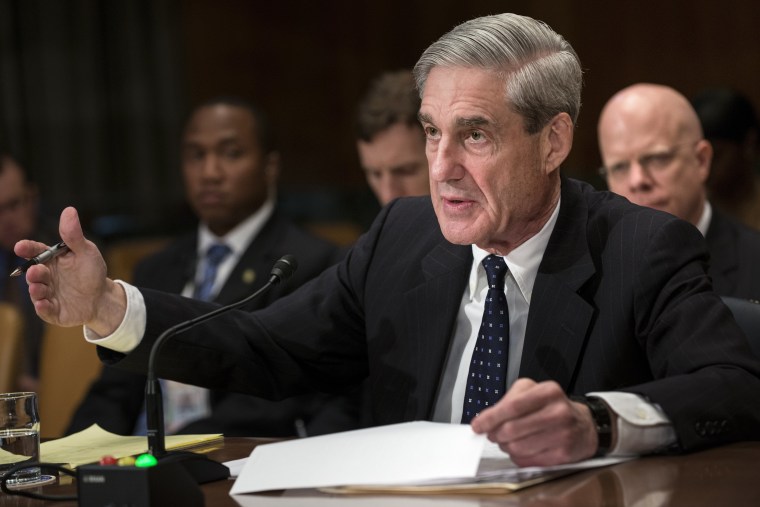If you've spent time watching former Special Counsel Robert Mueller's testimony this morning, you've probably noticed that he's deflected or declined to answer more than a few questions. NBC News has been keeping a running tally online, and the last time I looked, the total was well over 100.
That said, the witness has answered plenty of important questions, and many of the exchanges probably won't please the White House.
Former special counsel Robert Mueller told lawmakers on Wednesday that his investigation did not exonerate President Donald Trump and he explained why he decided not to consider criminal charges against the president.At the opening of Mueller's highly anticipated day of hearings before the House of Representatives on his two-year probe into Russia interference in the 2016 presidential election, Judiciary Committee Chairman Jerry Nadler, D-N.Y., asked the former special counsel if the probe cleared Trump."No," Mueller answered flatly.
This was, oddly enough, one of the first exchanges of the day, and it was also among the most important. Just minutes into the proceedings, Mueller confirmed that he did not exonerate the president, Trump's rhetoric notwithstanding, adding, "[T]he finding indicates that the president was not ... exculpated for the acts that he allegedly committed."
Mueller proceeded to discredit a variety of other talking points Trump and his allies have peddled in recent months, knocking down the president's claims, for example, that Mueller was interviewed to lead the FBI after James Comey's firing. The former special counsel also refuted related claims about his alleged conflicts of interest.
For good measure, Mueller made clear, in case there were any lingering doubts, that Russia targeted American elections because it wanted the Republican ticket to win.
Officials in the West Wing were also likely less than thrilled when Rep. Ken Buck (R-Colo.) asked Mueller, "Could you charge the president with a crime after he left office?" The former special counsel replied, "Yes."
Taken aback, Buck asked again, "You believe that you could charge the president of the United States with obstruction of justice after he left office?" Again, Mueller replied, "Yes."
But the exchange that may ultimately generate the most conversation came soon after, in response to a back-and-forth between the witness and Rep. Ted Lieu (D-Calif.).
The congressman asked, "The reason again that you did not indict Donald Trump is because of the OLC opinion stating that you cannot indict a sitting president, correct?"
Mueller replied, "That is correct."
In context, "the OLC opinion" refers to an analysis from the Justice Department's Office of Legal Counsel -- prepared long before Trump's presidency -- that says a sitting president can't be indicted. As you've probably heard, it's a controversial finding for a variety of reasons.
What was less clear this morning is exactly what Mueller meant with his answer. Was this an instance in which he was implicitly conceding that Trump would've been charged were it not for the office he currently holds, or was this simply a restatement of the Mueller report's finding that the entire issue was effectively off the table for investigators in light of the long-standing Justice Department policy?
Update: During the second round of congressional testimony this afternoon, Mueller clarified that his comments were intended as a restatement, not a bombshell.
